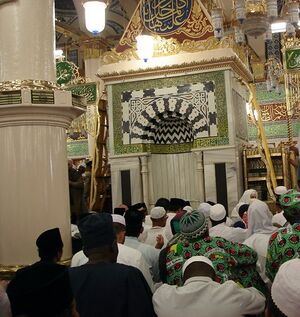Al-Sulaymani Mihrab: Difference between revisions
No edit summary |
|||
| Line 65: | Line 65: | ||
The al-Hanafi Mihrab was rebuilt in 938/1531-2 by the order of [[Sultan Suleiman I]], with the style of [[the Prophet's Mihrab]], and was decorated with black and white marble, and from then on, it became known as the al-Sulaymani Mihrab<ref>Rafʿat Pāshā, ''Mirʾāt al-ḥaramayn'', vol. 1, p. 470; Najafī, ''Madīnashināsī'', Vol. 1, p. 168,169</ref> Today, imam of congregational prayers of [[al-Masjid al-Nabawi do not stand in this mihrab rather they stand in [[al-'Uthmani Mihrab]]. | The al-Hanafi Mihrab was rebuilt in 938/1531-2 by the order of [[Sultan Suleiman I]], with the style of [[the Prophet's Mihrab]], and was decorated with black and white marble, and from then on, it became known as the al-Sulaymani Mihrab<ref>Rafʿat Pāshā, ''Mirʾāt al-ḥaramayn'', vol. 1, p. 470; Najafī, ''Madīnashināsī'', Vol. 1, p. 168,169</ref> Today, imam of congregational prayers of [[al-Masjid al-Nabawi do not stand in this mihrab rather they stand in [[al-'Uthmani Mihrab]]. | ||
== | ==Inscriptions== | ||
Behind the building of the mihrab, there is an inscription in gold script on a shiny red oil background, about the construction of the mihrab by the order of Sultan Suleiman I in the year 938/1531-2.<ref>Rafʿat Pāshā, ''Mirʾāt al-ḥaramayn'', vol. 1, p. 470; Najafī, ''Madīnashināsī'', Vol. 1, p. 168,169.</ref> | Behind the building of the mihrab, there is an inscription in gold script on a shiny red oil background, about the construction of the mihrab by the order of Sultan Suleiman I in the year 938/1531-2.<ref>Rafʿat Pāshā, ''Mirʾāt al-ḥaramayn'', vol. 1, p. 470; Najafī, ''Madīnashināsī'', Vol. 1, p. 168,169.</ref> | ||
Revision as of 17:47, 23 December 2023
 | |
| General Information | |
|---|---|
| Other Names | Al-Hanfi Mihrab |
| Place | al-Masjid al-Nabawi |
Al-Sulaymani Mihrab (Arabic: محراب سلیمانی) is one of mihrabs of al-Masjid al-Nabawi. This mihrab is on the right side of the the Prophet's Mihrab and the left side of the the Prophet's Pulpit. This mihrab was built in the mosque in the 9th/15th century and was the place of prayer for the followers of the Hanafi denomination. In 938/1531-2, by order of Sultan Suleiman I, this mihrab was rebuilt and since then it has been known as al-Sulaymani Mihrab.
Place
Al-Sulaymani Mihrab, which is also called al-Hanafi Mihrab, is one of the mihrabs of al-Masjid al-Nabawi in Medina. This mihrab is located within the area of the mosque in the time of the Prophet(a), outside the Rawda, at the southern area of the mosque (before the southern developments in the time of 'Umar and 'Uthman), in front and on the right side of the the Prophet's Mihrab and the left side of the Prophet's pulpit, in the place of the third column west of this pulpit and the seventh column of Bab al-Salam.[1]
Construction
Al-Sulaymani Mihrab was built in 861/1456-7 during the era of Malik al-Ashraf Abu Nasr Inal, the Mamluk sultan (Ruled: 857/1453-4 - 865/1460-1) by the supervisor of the affairs of al-Masjid al-Haram, Tughan Sheikh al-Ahmadi al-Hanafi (881/1476-7) the manager of al-Masjid al-Haram.[2] Before that, leaders of congregational prayer used to stand in the Prophet's Mihrab and in the al-'Uthmani Mihrab during the hajj season. Tughan Sheikh built a new mihrab in the mosque so that a separate congregational prayer could be held with a Hanafi leader.
After this date, the first congregational prayer was held following Shafi'i imam standing in the Prophet's Mihrab. Then a Hanafi imam led another congregational prayer in the new mihrab (which became known as the al-Hanafi mihrab and later the al-Sulaymani Mihrab). The Hanafi and Shafi'i imams performed the Tarawih prayer simultaneously on the nights of Ramadan.[3] This arrangement was followed in Mecca as well.[4]
Naming as al-Sulaymani Mihrab
The al-Hanafi Mihrab was rebuilt in 938/1531-2 by the order of Sultan Suleiman I, with the style of the Prophet's Mihrab, and was decorated with black and white marble, and from then on, it became known as the al-Sulaymani Mihrab[5] Today, imam of congregational prayers of [[al-Masjid al-Nabawi do not stand in this mihrab rather they stand in al-'Uthmani Mihrab.
Inscriptions
Behind the building of the mihrab, there is an inscription in gold script on a shiny red oil background, about the construction of the mihrab by the order of Sultan Suleiman I in the year 938/1531-2.[6]
Inside and around the mihrab is also decorated with inscriptions of verses of the Quran. The verses are: al-Baqara:162, Al 'Imran:95 and al-Tawba:112.[7]
Notes
- ↑ Ṣabrī Pāshā, Mawsūʿa mirʾāt al-ḥaramayn, vol. 4, p. 609; Rāfiʿī al-Sūdānī, Ittiḥāf al-muʾminīn, p. 82; Najafī, Madīnashināsī, vol. 1, p. 168.
- ↑ Sakhāwī, al-Tuḥfat al-laṭīfa, vol. 1, p. 474; Rafʿat Pāshā, Mirʾāt al-ḥaramayn, vol. 1, p. 469; Yūsuf, Maʿālim dār al-hijra, p. 250,251.
- ↑ Samhudi,Wafa' al-wafa, vol. 2, p. 210; Rafʿat Pāshā, Mirʾāt al-ḥaramayn, vol. 1, p. 469-470.
- ↑ Samhūdī, Wafāʾ al-wafā, Vol. 2, p. 210.
- ↑ Rafʿat Pāshā, Mirʾāt al-ḥaramayn, vol. 1, p. 470; Najafī, Madīnashināsī, Vol. 1, p. 168,169
- ↑ Rafʿat Pāshā, Mirʾāt al-ḥaramayn, vol. 1, p. 470; Najafī, Madīnashināsī, Vol. 1, p. 168,169.
- ↑ Ṣabrī Pāshā, Mawsūʿa mirʾāt al-ḥaramayn, vol. 4, p. 610; Rafʿat Pāshā, Mirʾāt al-ḥaramayn, vol. 1, p. 470; Najafī, Madīnashināsī, vol. 1, p. 169.
References
- Najafī, Sayyid Muḥammad Bāqir. Madīnashināsī. Tehran: Mashʿar, 1387Sh.
- Rafʿat Pāshā, Ibrāhīm. Mirʾāt al-ḥaramayn, aw, al-raḥlāt al-ḥijāziyya wa al-ḥaj wa mashāʿirihi al-dīnīyya. Beirut: Dār al-Maʿrifa, [n.d].
- Rāfiʿī al-Sūdānī, Musṭafā b. Muḥammad al-. Ittiḥāf al-muʾminīn bi-tārīkh Masjid Khātam al-Nabīyyīn. Medina: al-Maktabat al-ʿIlmīyya, 1404AH.
- Ṣabrī Pāshā, Ayyūb. Mawsūʿa mirʾāt al-ḥaramayn. 1st edition. Cairo: Dār al-Āfāq al-ʿArabīyya, 1424 AH.
- Sakhāwī, Muḥammad b. ʿAbd al-Raḥmān. Al-Tuḥfat al-laṭīfa fī tārīkh al-Madīna al-sharīfa’’. Beirut: Dār al-Kutub al-ʿIlmīyya, 1414/1993.
- Samhūdī, ʿAlī b. ʿAbd Allāh. ‘’Wafāʾ al-wafā bi-akhbār dār al-Muṣṭafā’’. Beirut: Dār al-Kutub al-ʿIlmīyya, 2006.
- Yūsuf, ʿAbd al-Razzāq. Maʿālim dār al-hijra. Medina: Maktabat al-ʿIlmīyya, 1401AH.